Sat Images After The Fact
He walks into the ready room, his hair matted with sweat. Fellow
pilots looked up expectantly from their recliners. "Hey, how'd it
go?" one asked. "You drop?"
"Yep," the pilot answered, still in his 70-pound olive green
flight suit, with the hose from his oxygen mask draped around his
neck like a scarf. Then he delivered the comic-book line fighter
pilots frequently toss around, a shorthand for mission
accomplished.
"Kaboom!"
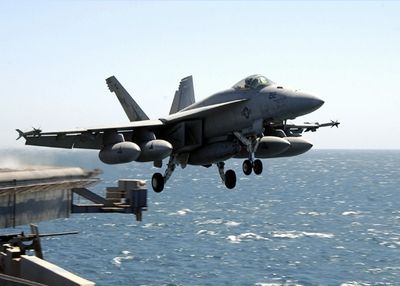
Silent Kill
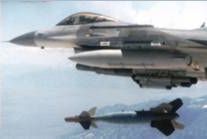 In fact, Navy pilots in the air campaign over Iraq
usually hear nothing when their bombs explode and often don't see
the blast, either. Their war is based on precision weapons, bombs
guided by lasers and satellites to targets with often pinpoint
accuracy. Since the start of military aviation, pilots have been
cushioned to some degree from the carnage of combat. But the
prevalence of sophisticated weaponry in this conflict offers an
unprecedented level of psychic insulation.
In fact, Navy pilots in the air campaign over Iraq
usually hear nothing when their bombs explode and often don't see
the blast, either. Their war is based on precision weapons, bombs
guided by lasers and satellites to targets with often pinpoint
accuracy. Since the start of military aviation, pilots have been
cushioned to some degree from the carnage of combat. But the
prevalence of sophisticated weaponry in this conflict offers an
unprecedented level of psychic insulation.
A satellite-guided JDAM bomb can travel up to 15 miles after it
is launched from under a jet's wing before it finds and devastates
its target. For a pilot 33,000 feet in the air, there is no
screaming to hear, no explosion, no sound other than his own
breathing.
"Afterwards, you see imagery from satellites, but you don't see
them carrying people off on stretchers," said Eric Doyle, a
29-year-old F/A-18E Super Hornet pilot from Houston. Doyle and the
other 16 elite pilots who fly the Super Hornets don't talk about
killing.
The men, mostly in their late twenties or early thirties,
instead focus on the electronics of their weaponry and supersonic
jets. They swap tales of maneuvers in the sky - how a jet veered at
the last minute to avoid missiles fired from the ground, how
another dove below a friendly plane that was too close or ran into
trouble with a tanker. They collect metal fuses from their dropped
bombs as souvenirs.
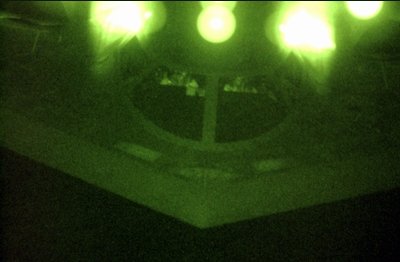
Not Something To Think About
"We know we're killing people," said Lt. Stan Wilson, 33, who
enlisted in the Navy at 18, left to attend college and then
rejoined to become a pilot. "We don't talk about it, don't worry
about it. I don't know how this sounds, but we're more selfish than
that. I worry about my car payments; the other guys worry about
their girlfriends and wives."
Wilson, a barber's son, gets a hero's welcome when he goes home
to Iowa. A color photograph of him is displayed in the barber shop;
he is a favorite speaker at the local American Legion post. He
doesn't want to consider whether his bombs have killed civilians.
"I'd rather not know about it," he said.
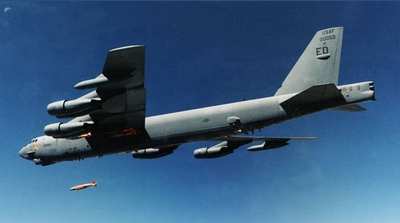
Post-Strike Matinee
One recent afternoon, a half-dozen Super Hornet pilots on the
USS Abraham Lincoln were clustered around a television in their
ready room, a space the size of a small classroom where they spend
most of their time when not flying or sleeping.
They were watching video shot from the cockpit of a Super Hornet
during a sortie the night before. The television showed a bright
light darting north on the dark green screen, pausing over the
target framed in a white box, then bursts of white and orange. The
men delighted in the explosions.
Their backs were turned on another television across the small
room. It was tuned to CNN and showed news footage of bloody,
bandaged Iraqi men lying on beds, casualties of U.S. assaults. The
pilots never glanced at that screen.
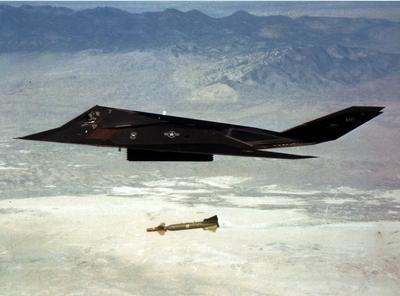
They live in a competitive world where success is measured by
delivering bombs to targets. "My job is to hit whatever target I've
been assigned to hit," Cmdr. Jeff Penfield, the commanding officer
of the Super Hornet squadron, said. "I don't think about it as
human life. I aim at hard things, and if there are people around, I
don't think about it."
But some of the pilots said they consider the moral dilemma of
their work. "I reflect on it on a daily basis," said Cmdr. Dale
Horan, 39, the squadron's executive officer, who bears enough
resemblance to the actor Woody Harrelson that his call sign is
Woody. "I want to do well," Horan said. "Yes, I get excited when
I'm successful and my bomb hits the target. But we're expending
precious treasure - blood and lives as well as equipment and
money."
Talking With God
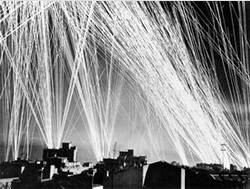 During
the first days of the air campaign, Horan said he had several
conversations with God. "I wanted to know why I was not getting
worked up about the fact that I was going to drop bombs and kill
people probably," Horan, who is a Lutheran, said. "How was it that
I was comfortable about this? I'm a Christian, and I don't believe
in killing people. So why was I feeling OK about this?"
During
the first days of the air campaign, Horan said he had several
conversations with God. "I wanted to know why I was not getting
worked up about the fact that I was going to drop bombs and kill
people probably," Horan, who is a Lutheran, said. "How was it that
I was comfortable about this? I'm a Christian, and I don't believe
in killing people. So why was I feeling OK about this?"
Rob Kihm, 28, a pilot from Los Angeles, dropped a laser-guided
bomb on a large Iraqi ammunitions depot outside Baghdad on March
29Saturday night. The next day he was still feeling the
exhilaration of hitting the target, evading enemy missiles and then
speeding back to the safety of the ship.
"It was the biggest explosion I'd ever seen," said Kihm, who was
smitten by the movie "Top Gun" in junior high school and gave up a
career as a chemical engineer to become a fighter pilot. "You're
seeing something exhilarating that most people don't get to see.
The natural reaction is to get excited."
But in quiet moments, Kihm considered something more troubling -
whether he killed Iraqi soldiers near the depot. "You start
thinking about these guys, and you know they're probably not
willing combatants, that they have a gun to their heads," said
Kihm, who graduated from the University of California, Berkeley,
and is known as the peacenik of the squadron. "So how are you
supposed to take this bombing? I don't have a good answer for
that."
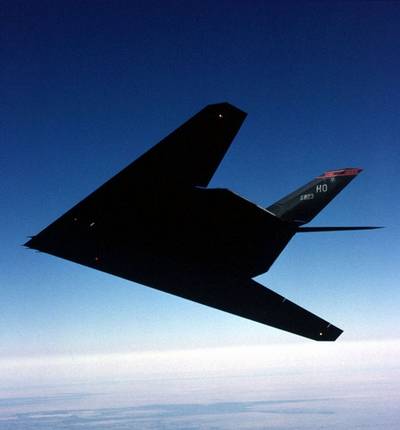
Horan said he found solace in an unwavering belief that the war
is just. "I just feel very satisfied with this mission and our
purpose and the way the U.S. is going about this," he said.
"Innocent people are going to die because of what we do. But this
is not firebombing Dresden or Tokyo," cities leveled in World War
II. Every pilot interviewed in the Super Hornet squadron echoed a
version of this statement. To a man, they said they were able to
drop their bombs because they trusted that military commanders were
choosing targets in a way that minimizes the deaths of
innocents.
"I have faith in the way we're doing things," Lt. Stephan Dean,
29, said. "I don't think that's deluding myself."
 Classic Aero-TV: The Switchblade Flying Car FLIES!
Classic Aero-TV: The Switchblade Flying Car FLIES! ANN FAQ: Q&A 101
ANN FAQ: Q&A 101 ANN's Daily Aero-Term (04.12.24): Discrete Code
ANN's Daily Aero-Term (04.12.24): Discrete Code ANN's Daily Aero-Term (04.13.24): Beyond Visual Line Of Sight (BVLOS)
ANN's Daily Aero-Term (04.13.24): Beyond Visual Line Of Sight (BVLOS) ANN's Daily Aero-Linx (04.13.24)
ANN's Daily Aero-Linx (04.13.24)









